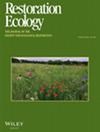The negotiation process of the EU Nature Restoration Law Proposal: bringing nature back in Europe against the backdrop of political turmoil?
IF 2.8
3区 环境科学与生态学
Q2 ECOLOGY
引用次数: 0
Abstract
In 2022, the European Commission proposed an EU Nature Restoration Law (Proposal). This was a groundbreaking proposal and would be the first comprehensive piece of binding international legislation that holds legally binding targets and deadlines for landscape‐wide restoration. Although the Proposal initially received very positive reactions from a variety of stakeholders, including scientists, organizations, and companies, certain lobby groups—mainly from the primary sectors (agriculture, forestry, and fisheries)—led a strong campaign against the Proposal, often based on unfounded arguments and short‐term considerations. After several nail‐biting voting rounds, a political compromise on an amended text was finally reached and awaits final approval. The Compromise still provides an appropriate legal basis for upscaling restoration within the EU through clear targets on restoration for different ecosystems and implementation obligations for Member States. However, we argue that, since the Compromise weakens the Proposal on some vital points regarding the operationalization of restoration at the national level, it remains uncertain whether the final law will produce the tangible effects that are necessary in the coming years.欧盟自然恢复法提案的谈判过程:在政治动荡的背景下让自然回归欧洲?
2022 年,欧盟委员会提出了《欧盟自然恢复法》(提案)。这是一项开创性的提案,将成为第一部具有法律约束力的综合性国际立法,为整个景观的恢复设定具有法律约束力的目标和期限。尽管该提案最初得到了包括科学家、组织和公司在内的各利益相关方的积极响应,但某些游说团体--主要是来自第一产业(农业、林业和渔业)的游说团体--发起了一场声势浩大的反对该提案的运动,其理由往往是毫无根据的论点和短期考虑。经过几轮针锋相对的投票,最终就修订案文达成了政治妥协,并等待最终批准。通过明确不同生态系统的恢复目标和成员国的实施义务,该折衷方案仍然为在欧盟范围内扩大恢复规模提供了适当的法律依据。然而,我们认为,由于《折中方案》削弱了提案中有关在国家层面实施恢复的一些关键点,最终法律能否在未来几年产生必要的实际效果仍不确定。
本文章由计算机程序翻译,如有差异,请以英文原文为准。
求助全文
约1分钟内获得全文
求助全文
来源期刊

Restoration Ecology
环境科学-生态学
CiteScore
6.50
自引率
15.60%
发文量
226
审稿时长
12-24 weeks
期刊介绍:
Restoration Ecology fosters the exchange of ideas among the many disciplines involved with ecological restoration. Addressing global concerns and communicating them to the international research community and restoration practitioners, the journal is at the forefront of a vital new direction in science, ecology, and policy. Original papers describe experimental, observational, and theoretical studies on terrestrial, marine, and freshwater systems, and are considered without taxonomic bias. Contributions span the natural sciences, including ecological and biological aspects, as well as the restoration of soil, air and water when set in an ecological context; and the social sciences, including cultural, philosophical, political, educational, economic and historical aspects. Edited by a distinguished panel, the journal continues to be a major conduit for researchers to publish their findings in the fight to not only halt ecological damage, but also to ultimately reverse it.
 求助内容:
求助内容: 应助结果提醒方式:
应助结果提醒方式:


